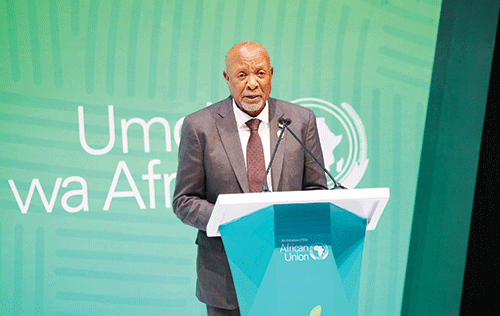President Nangolo Mbumba says Namibia is ready to play its part in the African continent’s quest to achieve food sovereignty.
He said Namibia, along with other SADC member states and key stakeholders, is also promoting the uptake and improved utilisation of quality fertilisers.
“Namibia is ready to play its part to contribute to food security on the continent. While imports of fertilisers into the continent are welcome, local production should be promoted and supported,” Mbumba said while addressing the Africa Fertiliser and Soil Health Summit yesterday in Nairobi, Kenya.
The head of state indicated that Namibia is endowed with natural wind and sun resources, and it is well on its way to becoming a competitive producer and exporter of green hydrogen.
He highlighted that green ammonia is a derivative of green hydrogen – and at full scale, Namibia will be producing about three million metric tonnes of green ammonia annually for regional and global markets.
“With increased local production of green ammonia, which is one of the ingredients necessary to produce fertilisers, our continent can augment food production through fertiliser usage,” stated Mbumba.
He added that agricultural produce can be further traded through the African Continental Free-Trade Area at an affordable price.
He encouraged the AU member states to endeavour to acquire fertilisers from Africa as a means of supporting efforts to produce more fertilisers locally.
Kenya’s president William Ruto is confident the summit will bring about changes in the sector and ultimately end issues around hunger, among others.
“We have made significant commitments in the areas of fertilisers, soil health and financing. I believe these commitments will greatly contribute to achieving the African we want as outlined in the AU agenda 2023,” he stated.
AU Commission chairperson Moussa Faki Mahamat said in terms of fertiliser use, Africa is below the global average and the target set in 2006 in Abuja by African heads of state of 50 kg per hectare per year.
“Eighteen years later, the average fertiliser use rate stands at about 18kg, less than half of the target set in 2006. We have a responsibility to learn and apply the lessons on why this gap remains,” stated Mahamat.
He indicated: “Ownership is partly hamstrung by over-dependence on partners for the financing of our agricultural development ambitions. It is simply not sustainable. We need renewed strong political will by the member states through the mobilisation of domestic resources to reflect the priority of the agricultural sector as defined in Malabo”.
Mahamat noted some African countries produce fertilisers, “but we depend mostly on imported fertilisers, which are expensive for our farmers. Yet the African Centre for Fertiliser Development in Zimbabwe has existed since 1982. We must optimise the use of such existing continental assets to boost local production and deliver quality, affordable fertilisers”.
According to the AU, the objective of the summit is to bring together all relevant stakeholders to highlight the crucial role of fertiliser and soil health in stimulating sustainable pro-poor productivity growth in African agriculture and to agree on an African fertiliser and soil health action plan, as well as the soils initiative for Africa.
It is expected that a 10-year action plan will be endorsed, which will deliver concrete recommendations for steps to be taken by African leaders and stakeholders over the next 10 years.
The summit is deliberating on Africa’s recent widespread, decades-long decline in the soil quality of farmland, a phenomenon that continues today and negatively impacts the agricultural production capacity and food security on the continent.
In June 2006, the heads of state and governments of the AU endorsed the Abuja Declaration on Fertiliser for the Africa Green Revolution, a continental strategy to reverse the worrying trend of poor productivity in African soils.
The declaration focused on key targets required for agricultural growth, food security and rural development in Africa, with a focus on the role of fertilisers.
It recommended raising the use of fertilisers from 8 kg/ha to 50 kg/ha in 10 years and the establishment of an African Fertiliser Financing Mechanism (AFFM) to improve agricultural productivity by providing the financing required to boost fertiliser use in Africa to achieve the target of 50 kg of nutrients per hectare as mandated by the Abuja Declaration.
(Fertilisers)


